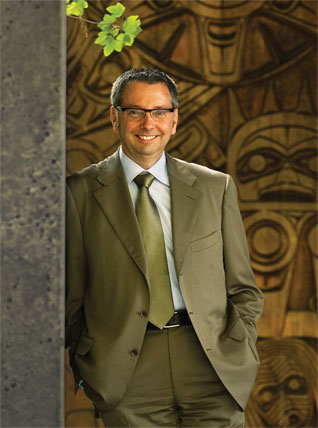Boundless Thinking
As a Canadian working internationally on issues of human rights and justice reform, I’ve seen first-hand how the power of unfettered ideas can transcend borders defined by mere geography, history, or ideology. Knowledge and discovery that may make the world a better place should know no boundaries -- an ideal that underpins UBC’s strategic plan Trek 2010 and is made explicit in the vision statement that introduces the document: The University of British Columbia, aspiring to be one of the world’s best universities, will prepare students to become exceptional global citizens, promote the values of a civil and sustainable society, and conduct outstanding research to serve the people of British Columbia, Canada, and the world. Whether it is through the collection of funds and supplies for flood victims in Asia, helping in the construction of homes and hospitals in remote parts of Africa or Latin America, or teaching English to a class of immigrant children on Vancouver’s Downtown Eastside, our students have shown that they do indeed believe in the ideals of global citizenship. Education and Social ResponsibilityAs you turn the pages of this brief account of UBC’s activities over the past year, you will see the faces of some of our most accomplished and dedicated students. They are indeed inspiring young people. But look beyond their individual achievements, and you will see that it is the integrated application of learning across disciplines, national boundaries, and social backgrounds that makes them -- and thousands of their fellow students -- so outstanding. For increasing numbers of UBC students, scholarship is integral to, and deeply enriches, their volunteer efforts. These students are blazing new trails in our global and local communities: inspiring former street youth, bringing the excitement of science to rural communities and returning athletic gifts in the form of mentoring. Even before they leave our campuses, they are assuming the rights and responsibilities of their global citizenship. And that kind of commitment is equally evident among our alumni, faculty, and staff members, who understand the importance of promoting a civil and sustainable society, and who have worked tirelessly to create new bonds between the university and the community through their teaching, research, and volunteer work. Global - and LocalFrom earliest times, universities have thrived on the infusion of different perspectives and the convergence of people and ideas from different cultures. In even the short time since my arrival this year, I’ve been struck by how UBC has welcomed students, faculty and staff from more than 100 countries. We truly are a global university. At the same time, “global” does not exclude “local.” Working closely with the University, the emerging University Town residential community on our Vancouver campus is helping to blur the border between town and gown, creating vibrant neighbourhoods with the culture, recreation and capacity for dialogue that only a university can foster. Our new UBC Okanagan campus in Kelowna, welcoming more than 3,000 students in its first year of operations, has already made signifi cant regional, cultural and economic connections, and has developed excellent relations with First Nations in the South Okanagan. Crossing BordersA particularly pleasing illustration of the way that the search for knowledge erases borders is provided by the arrival at UBC of Carl Wieman. Prof. Wieman -- you can read more about him in the Year in Review section in the middle of this report -- is not the first academic leaving one country to pursue a passion in another. True, it’s extremely rare when a Nobel Laureate (Physics, 2001) does it. But what is so exciting is the project he is undertaking to reduce barriers and distinctions between the university’s twin teaching and research missions by providing a uniquely supportive environment for instruction, and by investigating better ways to teach science to university students. UBC consistently rates among the world’s 40 best research universities, and the talent of our researchers indicates only greater recognition to come. However, we must continue to enhance the teaching side of our mission by bringing more of the excitement of research into the classroom, by creating initiatives such as Student Horizons in Education (SHINE) that invest in innovative teaching resources, or by offering interdisciplinary undergraduate programs that provide the breadth of view we all need to make sense of our complex world. Reading through this report, I am confident that the impact of the scholarship and service described here will spread far beyond the boundaries of our campuses to bring benefit to all. - Stephen Toope, President Profile of a New PresidentProfessor Stephen Toope was named the 12th President and Vice-Chancellor of The University of British Columbia on March 22, 2006. Founding President of the Pierre Elliott Trudeau Foundation from 2002, he was co-director of the University of Montreal-McGill University Institute for European Studies (2000-02) and was the youngest dean in the history of McGill University’s Faculty of Law (1994-99). Prof. Toope earned his PhD from Trinity College, Cambridge, following degrees in common law (LLB) and civil law (BCL) from McGill, and an AB in History and Literature from Harvard. His scholarly interests cover public international law, legal theory, human rights, international dispute resolution and family law. He represented Western Europe and North America on the United Nations Working Group on Enforced or Involuntary Disappearances (2002-05). A former President of the Canadian Council on International Law, Prof. Toope has served as board chair and member of numerous nongovernmental organizations promoting human rights and international development. |
 President Stephen Toope Looks Back at 2005 / 06
President Stephen Toope Looks Back at 2005 / 06